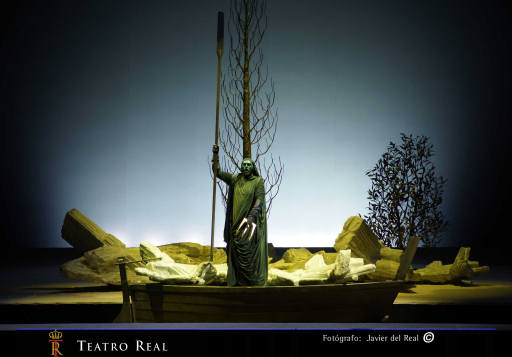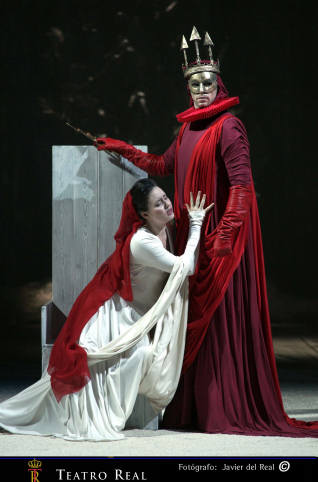Other Links
Editorial Board
-
Editor - Bill Kenny
-
Deputy Editor - Bob Briggs
Founder - Len Mullenger
Google Site Search
SEEN AND HEARD
INTERNATIONAL OPERA REVIEW
Monteverdi, Il Ritorno d’Ulisse in Patria:
Soloists,
Les Arts
Florissants. Conductor: William Christie. Teatro Real
de Madrid. 21. 4.2009 (JMI)
The sets fall somewhat short of what we usually expect from Pizzi,
with trees and a beach in the first act, followed by more trees in
Acts II and III. The possibilities that the libretto offers for the
appearances of the different Gods are not developed in this
production.
The costumes are attractive in general, especially for the Gods and
Penelope’s suitors. It is in the stage direction where Pizzi’s work
leaves more to be desired.
New Production by Teatro Real in co - production with La Fenice,
Venice.
Director: Pier Luigi Pizzi.
Sets and Costumes: Pier Luigi Pizzi.
Lighting: Sergio Rossi.
Cast:
Ulisse: Kobie Van Rensburg.
Penelope: Christine Rice.
Telemaco: Cyril Auvity.
Eumete: Joseph Cornwell.
Antinoo: Umberto Chiummo.
Anfinomo: Juan Sancho.
Pisandro: Xavier Sabata.
Eurimaco,Giove: Ed Lyon.
Melanto, Fortuna: Hanna Bayodi-Hirt.
Iro: Robert Burt.
Ericlea: Marina Rodríguez-Cusí.
L’Umana Fragilità: Terry Wey.
Minerva, Amore: Claire Debono.
Neptuno, Il Tempo: Luigi De Donato.
Giunone: Sonya Yoncheva.

Last year, Pier Luigi Pizzi’s work in L' Orfeo was very
interesting in the first half and rather less so in the second. This
time the whole production was less convincing than the first. The
musical quality of Monteverdi is beyond any discussion, but I
consider that an opera with three hours of music, in which the
singing is mostly declaimed recitatives, demands an enormous amount
of imagination and creativity from the director. The example of the
production of
L’Incoronazione di Poppea by Robert
Carsen, which we saw in Barcelona less than three
months ago, is a perfect case of how to bring life to the stage,
using imagination. Pizzi always has been a director who has offered
spectacles of high aesthetic quality, both in sets and costumes, but
it is necessary to do more than this to fully succeed in Il
Ritorno d’Ulisse.

William Christie and Les Arts Florissants are one of the best
orchestras working in this field. Christie’s direction from the
harpsichord was a model of sensitivity and gentleness and without
a doubt, he was the triumph of the evening. The small orchestra,
composed of only 17 musicians, offered a wonderful version of the
score.
The vocal casting did not offer singers of great character and
though the singing was perfectly correct,
it had little real distinction. The
protagonist, Ulisse, was the South African tenor Kobie Van Rensburg,
who replaced Dietrich Henschel, the German baritone initially
announced. I believe that we lost out with the change to some
degree, although Van Rensburg gave a good performance.
English mezzo Christine Rice did not go much beyond
acceptable accuracy as Penélope, except in the final duet with
Ulisse, where she gave the best singing of the evening.
The
French tenor Ciril Auvity was an outstanding Telémaco however. He has
become one of best performing today in this type of repertoire and the English
tenor, Joseph Cornwell, was a good Eumete. Among Penélope’s
suitors, Umberto Chiummo was a disappointing Antinoo, whose voice was less
than attractive, at least to my ear. Juan Sancho was a good Anfinomo, whereas
the countertenor Xavier Sabata was a truly remarkable Pisandro
The Gods did not do justice to their exalted rank.
Another British tenor, Ed Lyon, also offered a rather unattractive voice as
Eurimaco and Jupiter, while Luigi De Donato was somewhat coarse as Neptune and
Time. The goddesses were much better than their gods,
particularly Claire Debono as Minerva and Love. The Bulgarian soprano Sonya
Yoncheva also made an impact in the very brief part of Juno.
Once again the young Moroccan Hanna Bayodi-Hirt made a good impression as Melanto
and Fortune, while Marina Rodriguez-Cusí was good as Ericlea.
Robert Burt overacted as Iro. Finally, countertenor Terry Wey sang with
taste but not much volume as Human Fragility.
There was a full theatre, with some seats emptying during the performance and a
warm final reception was given but without any great enthusiasm. The biggest
ovations went to William Christie and his orchestra.
José M Irurzun
Pictures © Javier del Real
Back
to Top
Cumulative Index Page
